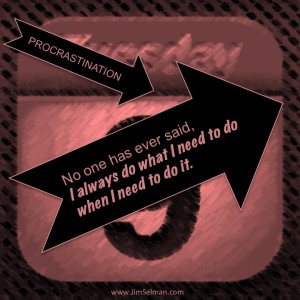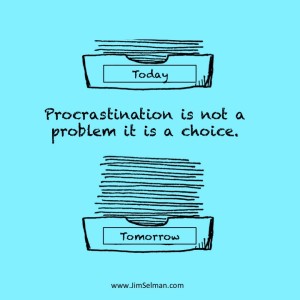 It’s a bit more than a week into the new year and I am already behind on all the things I was going to get done during the post-holiday lull. I am procrastinating. As with many of my less agreeable habits, I decided to do a workshop on the subject for a European client late last year. The overarching question of why we procrastinate was framed a bit more specifically as “Why don’t we do the things we KNOW we need to do to accomplish what we SAY we want to accomplish?” The correlation to this question is if we don’t know what to do, why do we put off some action to learn or be coached to move forward to achieve whatever we say we want?
It’s a bit more than a week into the new year and I am already behind on all the things I was going to get done during the post-holiday lull. I am procrastinating. As with many of my less agreeable habits, I decided to do a workshop on the subject for a European client late last year. The overarching question of why we procrastinate was framed a bit more specifically as “Why don’t we do the things we KNOW we need to do to accomplish what we SAY we want to accomplish?” The correlation to this question is if we don’t know what to do, why do we put off some action to learn or be coached to move forward to achieve whatever we say we want?
One of the first things that became obvious is that everyone has a conversation about procrastination. No one has ever said, “I always do what I need to do when I need to do it”. Furthermore, it is generally a negative self-assessment. I also haven’t heard anyone say “I am just fine and happy not doing what I know I need to do.“ There always seems to be some explanation or justification and most of us know that whatever our story, it is a pretty thin excuse. The excuse I hear most often is a variation of ‘it’s just the way I am’, which somehow seems to stop the conversation and kill any possibility of changing one’s practices. I am sure there must be some super-disciplined people who do manage themselves and their schedules so that everything they do is a conscious choice, but I think they are rare and the exceptions that prove the rule.
As we delved into our own experience as procrastinators we could see that the overriding belief that justifies most procrastination is a misconception about the nature of time. Most of us believe that there is a future — in the future. That is, we say that we’ll get to it tomorrow as if tomorrow exists independent of today. As a consequence, shifting or delaying a task to another day is as easy as moving the furniture in your office. If we think about it, tomorrow doesn’t exist yet, and when we wake up it will be today again. Tomorrow never arrives and is always a concept in our mind today. It is a pure abstraction that we believe is ‘real’. Moreover we generally think about tomorrow as an extension of the past. This is the basis for the famous French aphorism: “the more things change, the more they stay the same.” One of my favorite formulations for this idea is that “Yesterday is just a memory, tomorrow is just a dream and today is always just a conversation — usually about yesterday and tomorrow”. But action can only happen in the present. Action can never happen in the future.
A second rationale that contributes to the persistence of the habit of procrastinating is that whatever the ‘it’ is that we’re putting off doesn’t matter, or it doesn’t matter if it gets done. This is reinforced some times as a choice about priority, although most of us know that the priority justification usually follows the moment we decide or begin to procrastinate, and that it is not uncommon to then procrastinate about doing whatever we thought was a higher priority. There always seems to be another ‘something’ to displace whatever it is that we’re putting off. This leads to the question of whether procrastination is a choice at all. In fact we can easily observe it as a pattern that is omni-present and over which we generally have no control. I say ‘generally’ because it is also true that from time to time we grit our ‘teeth’ and ‘just do it’. I am thinking of when I finally resolve to clean the garage today and force myself into action regardless of the nagging desire to do almost anything else instead.
 Like most strong habits, patterns or even addictions — the issue is more the persistence of the undesired behavior as much as whatever the behavior may be. There is certainly nothing ‘wrong’ with putting off something or choosing to do something else. The problem is always the self-judgment and meaning we give to the practice afterwards. A variation of “darn, why don’t I have more will power” or “I should have done it, or should do it now or should be more motivated or whatever ever else I think I should be or do to get it done”.
Like most strong habits, patterns or even addictions — the issue is more the persistence of the undesired behavior as much as whatever the behavior may be. There is certainly nothing ‘wrong’ with putting off something or choosing to do something else. The problem is always the self-judgment and meaning we give to the practice afterwards. A variation of “darn, why don’t I have more will power” or “I should have done it, or should do it now or should be more motivated or whatever ever else I think I should be or do to get it done”.
The final insight we learned about ourselves followed some reflection about what is going on when we DON’T procrastinate. What we saw was that when we are genuinely committed, we either get it done or are pulled into some other action and do not ‘feel bad’ about not getting it done. In other words when we are committed and in action, there is no procrastination, even if we aren’t doing everything on our ‘to do’ list. This suggests that procrastination doesn’t really exist, other than as some set of judgments about what we are doing or not doing.
Moreover, procrastination is a conversation that is more of a cover-up than an excuse. It blinds us to the fact that we’re always choosing, and allows us to conceal or deny our responsibility for our choices. When I beat myself up for putting off something I think I SHOULD BE DOING, or feel bad when I don’t do what I know I should do, then I am blaming procrastination for my actions and even for my experience. I am giving my power to the pattern or the habit, and eventually becoming resigned that I have no choice about whether I procrastinate or not.
 At the end of the day, we realized as I realize now, that procrastination is not a problem it is a choice. When we remember that we are the chooser we can disconnect from our story about the way we are or the way it is and become present to what is calling to us to be done. We can learn to ‘listen’ for what really needs doing, as opposed to what is merely important or desirable. The more we learn to be present, the less time we spend in yesterday and tomorrow ,and the more fully we can experience and participate in life as it is happening each and every moment of today.
At the end of the day, we realized as I realize now, that procrastination is not a problem it is a choice. When we remember that we are the chooser we can disconnect from our story about the way we are or the way it is and become present to what is calling to us to be done. We can learn to ‘listen’ for what really needs doing, as opposed to what is merely important or desirable. The more we learn to be present, the less time we spend in yesterday and tomorrow ,and the more fully we can experience and participate in life as it is happening each and every moment of today.
I am now learning to uses my procrastination habit as a reminder and a way of learning to live in the present, free of guilt and negative judgments about what I am not doing and becoming more fully alive and appreciative of what I am doing.
